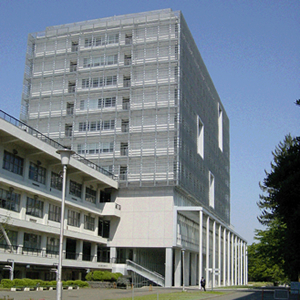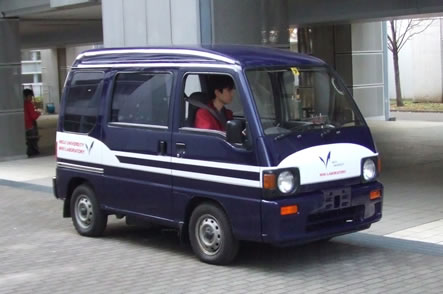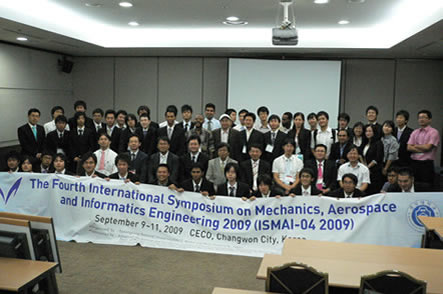Department of Electronics and Bioinformatics

Electronics and electrical engineering are two of the most important basic engineering fields sustaining our modern lifestyle. The Department of Electronics and Bioinformatics is a fascinating new department that integrates these two research/study fields with the fields of life science and biotechnology.

Electric Vehicles
In the Department of Electronics and Bioinformatics, we develop electric vehicles to evaluate the control methods and efficiency of the motor (equivalent to the engine of a conventional vehicle), as well as its noise emissions and vibration.
Department of Mechanical Engineering

Planetary exploration spacecraft used
in joint research with JAXA
The scope of mechanical engineering is expanding with the expansion of science and technology to include such fields as automobiles and airplanes that are safe and have a low environmental load, robots that operate in outer space or extreme environments, industrial machinery and plants that produce a wide variety of products, systems enabling efficient use of energy?imperative for a recycling society?and technology supporting information/communication and health/medical care. The Department of Mechanical Engineering nurtures practical-minded engineers and researchers with solid basic skills in mechanical engineering, broad applied skills that keep pace with advances in technology, and a high sense of ethics commensurate with science and technology who can respond flexibly with comprehensive thinking and play an active role in a range of fields.

Snapshot taken at an international conference held jointly with a Korean university (ROK)
Department of Mechanical Engineering Informatics

For our irreplaceable earth and for nurturing a rich spirit
To surmount the crucial difficulties such as the global warming in our earth and the aging problem in Japan, it is necessary for us to promote innovative technological developments and to nurture young smart engineers or researchers who overcome the difficulties with a rich spirit. The undergraduate students in our Department, for this purpose, learn the electrotechnology and the computation technology together with the conventional mechanical engineering, with which the students are able to overcome the difficulties. The first and second year students in this Department learn the basic fields of the mechanical engineering, the electric circuit theory, and the information processing. The junior students design the robot arms and the ancient Chinese vehicle with a compass whose needle always pointed south synthesizing the knowledge learned in the earlier grades. The senior students study topical problems in laboratories as graduation assignment. The students will be able to acquire an ethical sense as engineers or researchers to work in the international community, the abilities to find problems and solve them by oneself, and the abilities to design systems as engineers.

A tendon-driven biped robot (Sideview)
The knee and ankle joints are driven with flexible tendons which absorb the landing impact energy and reuse it.
Department of Architecture

Architecture, which sustains people's living environments, comprises knowledge in such specialist fields as planning/design, structure/materials/construction, and environment/utilities. Through education and research in these specialist fields, the Department of Architecture aims to nurture architecture professionals with the broad knowledge and diverse skills necessary for creating safe, secure, and comfortable living spaces/environments and cityscapes.
Department of Applied Chemistry

From Flasks to Computers
What skills are required by those undertaking cutting-edge research in applied chemistry and borderline fields? In future, a person will need to possess abundant knowledge and the ability to formulate research plans based on this knowledge in order to become a researcher or engineer. These skills are supported by basic experimental technology such as the synthesis and separation, in addition to computer applications, such as molecular design and chemical process/operation designs for chemical processes. The motto of the Department of Applied Chemistry is nurturing graduates who have mastered everything "from flasks to computers."
Department of Computer Science

The Department of Computer Science undertakes education and research concerned with information-related theory, computer software and hardware, and information systems, but also proactively examines areas bordering on other fields. Students are provided with innovative lectures, practical training, and small-group instruction.
Through exercises and practical training using computers, they are able to learn basic theory and skills.
From their first year, students also participate in small-group seminars.
In their third year, they join a research laboratory and receive individual guidance from instructors in seminars and as part of their graduation research.
Through their studies, students can acquire problem-finding and problem-solving skills that enable them to respond to the rapidly changing times.
Department of Mathematics

The central activities in the department of mathematics is forced on students' studying many major disciplines of modern mathematics, which are actually the basic foundation of modern sciences and scientific technologies as well as a key player of many emerging frontier fields in modern society.
The most striking feature of our department is a special form of lessons, called a seminar, after the famous German mathematician named G. Jacobi. In the seminars students are expected and requested to give their own talk by themselves to friends, tutors, and professors.
Sometimes students are requested to show the result of complicated calculation by using computers.
Department of Physics

Physics is a science that finds out the principles of nature through which you can understand various natural phenomena. Thinking by yourself with those principles, which is a basic stance of physics, enables you to go your own way in confronting any situation in society you will be thrown into. You will take pleasure in experiencing things such as a beautiful sunset, twinkling stars in the night sky, and sparkling rubies when you find "Physics" in those phenomena. Having a friendly relationship with physics, you will be able to enrich your life further.
Office of General and Cultural Studies

In addition to eight specialist departments, the School of Science and Technology also includes a program called Office of General and Cultural Studies under which instructors in foreign languages, humanities fields, and health/sports specialties provide general education. In both large-scale lectures and small-group seminars, instructors provide detailed, easy-to-understand instruction in such subjects as literature, philosophy, art, history, linguistics, cultural anthropology, and physical science. It is anticipated that students will achieve personal growth through these classes.
























































